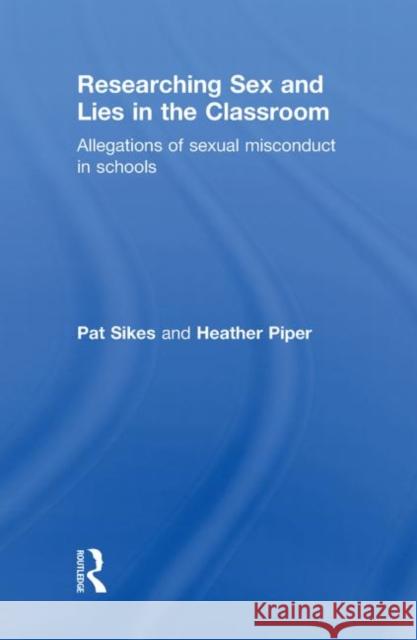Researching Sex and Lies in the Classroom: Allegations of Sexual Misconduct in Schools » książka
Researching Sex and Lies in the Classroom: Allegations of Sexual Misconduct in Schools
ISBN-13: 9780415481175 / Angielski / Twarda / 2010 / 164 str.
Researching Sex and Lies in the Classroom: Allegations of Sexual Misconduct in Schools
ISBN-13: 9780415481175 / Angielski / Twarda / 2010 / 164 str.
(netto: 603,92 VAT: 5%)
Najniższa cena z 30 dni: 579,30
ok. 22 dni roboczych.
Darmowa dostawa!
The Anglophone world is gripped by a moral panic centred on child abuse in general and fear of the paedophile in particular. Evidence suggests an alarming rise in the number of false allegations of sexual abuse being made against teachers, and demonstrates that the fallout from being falsely accused is far-reaching and sometimes tragic. Many people in this position cannot sustain family relationships, have breakdowns, and are often unable to return to the classroom when their ordeal is over. Researching Sex and Lies in the Classroom draws on in-depth qualitative research exploring the experiences, perceptions and consequences for those who have been falsely accused of sexual misconduct with pupils, and for the family members, friends and colleagues affected by or involved in the accusation process. The book also highlights the dilemmas and difficulties the authors themselves have faced researching this field, such as:
- ethical and methodological concerns over whether or not the teachers had indeed been falsely accused, or were guilty and taking advantage of this project to construct an alternative, innocent identity
- the difficulty of obtaining institutional ethical clearance to undertake and publish research which challenges master narratives concerning children and their protection
- the reluctance of funders to support research in controversial and sensitive areas.
Within the Western world as a whole, recent years have seen a number of high profile cases of alleged sexual abuse of children. Some of these cases have involved families, family friends and/or paedophile rings, while in others, people with responsibility for youngsters, such as carers, priests and teachers, have been implicated. Evidence suggests that there has been an alarming rise in the number of false allegations of abuse made against teachers working in schools and the fallout from being falsely accused is far-reaching and sometimes tragic. Many people in this position cannot sustain family relationships, have breakdowns, and are, for a number of reasons, unable to return to the classroom when their ordeal is over. Statistics show that a ‘significant number of people resign after an allegation is made against them’ regardless of the veracity of the accusation.
This book draws on in-depth, qualitative research exploring the experiences, perceptions and understandings of those who have been falsely accused of sexual misconduct with pupils or young people, and of others affected by or involved in, the accusation process (e.g. family members, friends, colleagues). As well as presenting the findings in a storied, often shocking form, the book also discusses the dilemmas and difficulties the authors themselves have faced researching this field. These include:
- ethical and methodological concerns around whether or not the teachers had indeed been falsely accused or were guilty and were taking advantage of our project to construct an alternative, innocent identity;
- the difficulty of obtaining institutional ethical clearance to undertake and also to publish research which challenges taken for granted tenets;
- the reluctance of funders to support research in controversial and sensitive areas.
These research-related experiences and the authors reflections upon them have implications far beyond the topic. They also raise general questions about the surveillance and control of research and academic freedom and voice. As the authors point out, ethical research is of paramount importance and it is the role of a just society to support attempts to seek to ensure that research participants, and researchers themselves, are protected from harm and distress.











